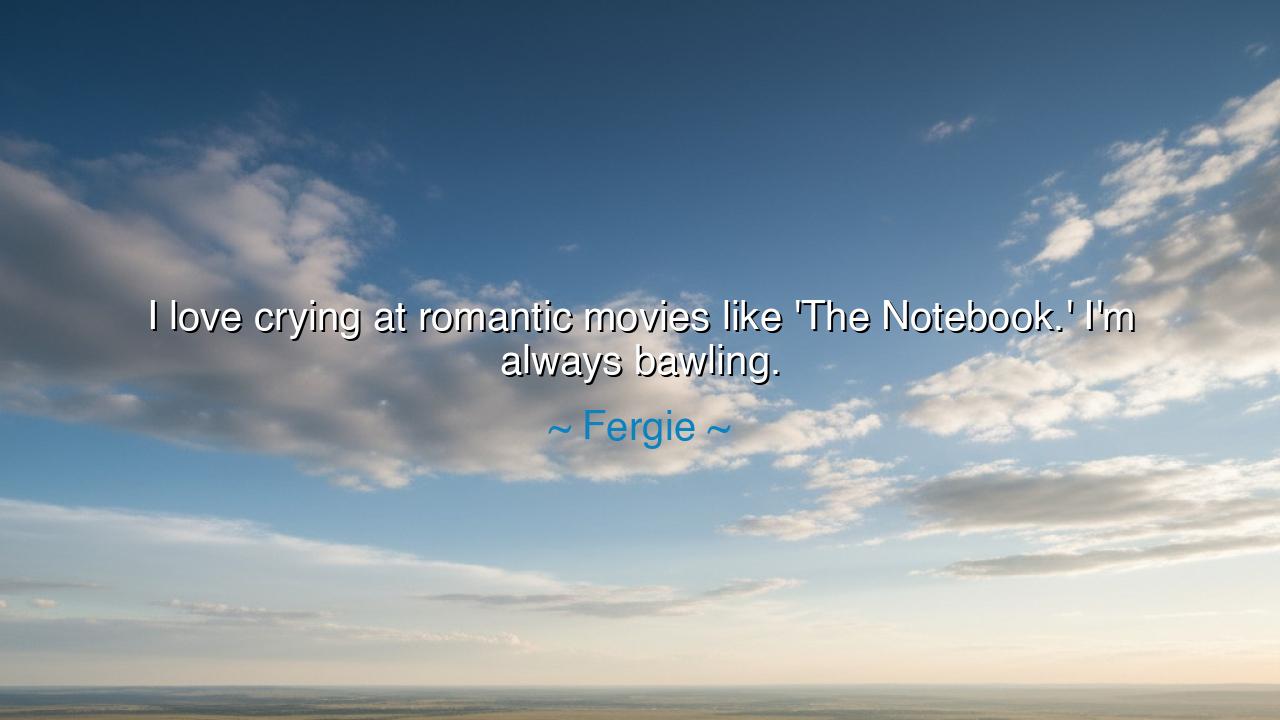
I love crying at romantic movies like 'The Notebook.' I'm always






"I love crying at romantic movies like 'The Notebook.' I'm always bawling." – Fergie. These words express a deep, almost cathartic engagement with the romantic and emotional experience of film. Fergie admits to being moved by the raw intensity of romantic love as portrayed in movies like The Notebook, where the love story is not just about affection, but about the pain, sacrifice, and enduring devotion that come with it. Crying at such films is not just a response to sadness; it is a release—a recognition of the human longing for love that transcends time and challenges. It speaks to the way romantic stories touch upon the universal emotions that bind us together as humans, reminding us of our vulnerabilities, desires, and dreams.
In the ancient world, romantic love was a central theme in stories that explored the depths of human emotion. Take the myth of Orpheus and Eurydice, for instance. Their tragic love story, where Orpheus attempts to bring Eurydice back from the Underworld, reflects the immense pain and yearning that love can inspire. Orpheus’s tears and his eventual loss are emblematic of the human condition: love that is both beautiful and tragic. The story encapsulates not only devotion but the painful acknowledgment that even the most passionate love can lead to suffering and loss. Fergie’s crying at romantic films like The Notebook evokes this timeless longing for a love that transcends all obstacles, a love that exists in dreams and stories, yet resonates with our deepest human desires.
The act of crying in response to such stories is not a mere expression of sadness but also of recognition. Emotion, in its purest form, is not simply a reaction to the immediate moment but a mirror of our own lives and experiences. In the ancient tragedies, the audience would often be moved to tears not just because of the characters' plight, but because they saw their own humanity reflected in the characters’ struggles and triumphs. Sophocles' Antigone is a prime example. As the heroine of the play defies the king’s orders to honor her brother with a proper burial, the audience feels her grief and courage because they recognize something universal in her actions: the tension between duty and love, between personal desire and societal law. In much the same way, when Fergie cries watching The Notebook, she is not just responding to the story but to the profound human experiences it evokes within her.
In Shakespeare’s Romeo and Juliet, we encounter yet another epic of romantic love marked by tragedy. The intensity of Romeo and Juliet’s love is so all-consuming that it defies the conventions of their world. Their love, though brief, remains one of the most romanticized in all literature, and its tragic end leads to deep sorrow in the hearts of the audience. Fergie’s emotional response to films like The Notebook mirrors the timeless appeal of tragic romance—where the love between the characters is pure, intense, and destined for heartbreak. Romantic tears are, in this sense, a ritualistic release, a recognition that love is complex, both elevating and destructive in equal measure.
The lesson in Fergie’s vulnerability, in this case, is that emotion—particularly romantic emotion—is not a weakness but a strength. In the same way that the ancients used tragedy to explore human nature, we too can use romantic stories to reflect on our own lives, understanding the depths of our emotions and the complexities of human relationships. Tears in response to a romantic film are not a sign of weakness but of connection to something greater—the universal longing for a love that transcends time, distance, and even death. Crying is a release, a healing, and a way to recognize the beauty and pain that come with truly living.
In our own lives, we should embrace the full range of emotions that come with romantic love—the joy, the passion, the sorrow, and the sacrifice. Love is not just an ideal or a fleeting moment of happiness, but a force that encompasses the whole of our emotional experience. Just as Fergie finds meaning in the tears shed for characters whose love stories echo her own feelings of longing, we should allow ourselves to experience and reflect on the depth of our emotions in relationships. Love is not meant to be contained or diminished by fear or avoidance of suffering, but rather embraced for its transformative and expansive qualities.
Thus, let us cherish the emotional responses that romantic art brings into our lives, for they are not signs of weakness but of our connection to the human spirit. Like Fergie, we must recognize that to be moved by a romantic movie or a tragic love story is to honor the full spectrum of our shared human experience. In doing so, we acknowledge that love—its beauty, its complexities, and even its pain—is what truly makes us human. Let us not shy away from those emotions, but instead, let them guide us to greater self-awareness, compassion, and an ever-deepening appreciation for the richness of life and love itself.






AAdministratorAdministrator
Welcome, honored guests. Please leave a comment, we will respond soon